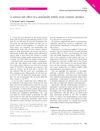 112 citations,
October 2005 in “Mayo Clinic Proceedings”
112 citations,
October 2005 in “Mayo Clinic Proceedings” Minoxidil and finasteride can slow hair loss and stimulate regrowth, but won't restore all lost hair or reverse complete baldness.
[object Object]  July 1997 in “Journal of Cutaneous Medicine and Surgery”
July 1997 in “Journal of Cutaneous Medicine and Surgery” Finasteride significantly increases scalp hair and prevents hair loss in young and middle-aged men.
 26 citations,
January 2019 in “Expert Opinion on Investigational Drugs”
26 citations,
January 2019 in “Expert Opinion on Investigational Drugs” New treatments for hair loss show promise, but more research is needed to confirm their safety and effectiveness.
 6 citations,
August 2006 in “Journal of Cutaneous Pathology”
6 citations,
August 2006 in “Journal of Cutaneous Pathology” Two teenage brothers had a rare, treatment-resistant form of female-pattern hair loss with unusual scalp changes.
 1 citations,
January 2009 in “Drug delivery system”
1 citations,
January 2009 in “Drug delivery system” Anti-aging treatments like hair transplants, minoxidil, and finasteride effectively promote hair growth.
 January 2003 in “Humana Press eBooks”
January 2003 in “Humana Press eBooks” Dihydrotestosterone and 5α-Reductase play a role in hair loss and prostate health, and finasteride can increase hair growth in men without affecting sperm production, but it doesn't work for postmenopausal women with hair loss.
 1 citations,
August 1999 in “PubMed”
1 citations,
August 1999 in “PubMed” Finasteride 1 mg effectively treats male pattern hair loss with minimal side effects.
4 citations,
April 2020 in “Dermatology practical & conceptual” Topical finasteride works faster and better than 17α-estradiol for postmenopausal hair loss.
 7 citations,
August 2019 in “Aesthetic Plastic Surgery”
7 citations,
August 2019 in “Aesthetic Plastic Surgery” Both surgical and non-surgical hair loss treatments lack a standard treatment plan and sufficient patient satisfaction data.
June 2019 in “Journal of Drug Delivery and Therapeutics” Finasteride effectively treats hair loss and prostate issues with minimal side effects.
 1 citations,
November 2016 in “Journal of the Dermatology Nurses’ Association”
1 citations,
November 2016 in “Journal of the Dermatology Nurses’ Association” Finasteride treats hair loss but may cause side effects like low libido and dizziness.
 4 citations,
April 2021 in “Journal of Cosmetic Dermatology”
4 citations,
April 2021 in “Journal of Cosmetic Dermatology” Botulinum toxin may help hair loss by increasing blood flow and reducing harmful factors.
 November 2023 in “Expert Opinion on Pharmacotherapy”
November 2023 in “Expert Opinion on Pharmacotherapy” Finasteride and dutasteride are effective in treating male hair loss but can cause sexual side effects and birth defects.
April 2023 in “Journal of Investigative Dermatology” A new treatment for hair loss shows promise with fewer side effects.
November 2022 in “Journal of Education, Health and Sport” Combination therapy for hair loss can improve results and reduce side effects.
 October 2024 in “Journal of Drugs in Dermatology”
October 2024 in “Journal of Drugs in Dermatology” Combining finasteride with minoxidil is more effective for male hair loss than using minoxidil alone.
March 2021 in “Berkala Ilmu Kesehatan Kulit dan Kelamin” The best treatment for male pattern baldness is a combination of topical minoxidil and oral finasteride.
1 citations,
December 2019 in “Journal of skin and stem cell” PRP shows promise for short-term hair growth, especially in young men.
 January 2024 in “Journal of Natural Remedies”
January 2024 in “Journal of Natural Remedies” Solanum nigrum extract may help regrow hair.
 24 citations,
December 2013 in “Sexual medicine reviews”
24 citations,
December 2013 in “Sexual medicine reviews” Finasteride can cause sexual problems and depression in young men.
 3 citations,
January 2015 in “Clinical and Experimental Dermatology”
3 citations,
January 2015 in “Clinical and Experimental Dermatology” A man developed a serious muscle breakdown condition after using a hair loss medication not known to cause this side effect.
 16 citations,
January 2010 in “Drug Metabolism and Pharmacokinetics”
16 citations,
January 2010 in “Drug Metabolism and Pharmacokinetics” Finasteride's effect on hair loss and prostate enlargement depends on its binding to an enzyme, with maximum impact at 0.2 mg dose.
 112 citations,
July 2012 in “The Journal of Sexual Medicine”
112 citations,
July 2012 in “The Journal of Sexual Medicine” Finasteride may cause long-lasting sexual side effects.
 18 citations,
March 2008 in “British Journal of Dermatology”
18 citations,
March 2008 in “British Journal of Dermatology” Finasteride works better for hair loss in patients 26 or younger.
 88 citations,
January 2013 in “Indian Journal of Dermatology, Venereology and Leprology”
88 citations,
January 2013 in “Indian Journal of Dermatology, Venereology and Leprology” Minoxidil and finasteride effectively treat hair loss.
 137 citations,
March 2006 in “Cns Drug Reviews”
137 citations,
March 2006 in “Cns Drug Reviews” Finasteride treats enlarged prostate and hair loss, but may cause side effects in some patients.
 November 2020 in “Elsevier eBooks”
November 2020 in “Elsevier eBooks” Antiandrogens and androgen inhibitors like spironolactone, finasteride, and dutasteride can treat hair loss and skin conditions, but they have risks and side effects, including potential harm to pregnant women and risks of cancer and heart issues. Herbal remedies also have antiandrogenic effects but lack safety validation.
 32 citations,
March 2020 in “Drug Design Development and Therapy”
32 citations,
March 2020 in “Drug Design Development and Therapy” Finasteride shows promise for female hair loss, but more research needed.
[object Object]  66 citations,
April 2002 in “Journal of The American Academy of Dermatology”
66 citations,
April 2002 in “Journal of The American Academy of Dermatology” Finasteride increases hair weight and count in men with hair loss.
 46 citations,
October 1999 in “Journal of The American Academy of Dermatology”
46 citations,
October 1999 in “Journal of The American Academy of Dermatology” Finasteride effectively treats male pattern hair loss with a 1 mg daily dose.
























